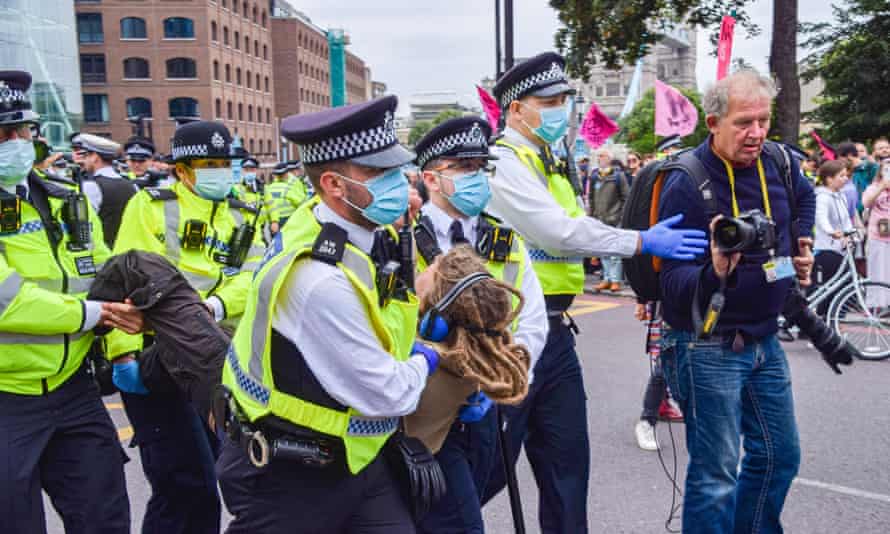Cop26 activists fear influx of English officers endangers ‘friendly’ policing
Climate groups concerned about presence in Glasgow of officers from forces known for heavy-handed tactics

Climate campaigners are worried an influx of officers from elsewhere in the UK will undermine Police Scotland’s commitment to rights-based policing of protests at Cop26.
Groups planning protests around the critical November conference have told the Guardian they are concerned about the presence of officers from forces known for their use of heavy-handed tactics and that it is unclear how they will be held to account for their behaviour.
Quan Nguyen, the Scottish coordinator of the activist group Cop26 Coalition, said one major concern was that English forces were already implicitly applying the police and crime bill – widely condemned as a significant undermining of the right to protest.
“Officers coming up to Glasgow will bring this mentality that any kind of protest or disruption needs to be cut off as quickly as possible,” Nguyen said. “Police Scotland, outnumbered by thousands of officers from elsewhere, has said it will be respectful of people’s right to protest but they have indicated they won’t tolerate any real disruption.”
About 10,000 officers, drafted from across Scotland and the rest of the UK, will be deployed each day in Operation Urram – named using the Scots Gaelic word for “respect”. Although senior Police Scotland officers have sought to reassure campaigners that their approach to protests will be “welcoming, friendly and proportionate”, the silver commander, Ch Supt Mark Hargreaves, said this week there would be a “low tolerance” for motorway disruption.
Nguyen said: “Police Scotland also needs to show it understands the necessity to protest at a significant international moment like Cop26, set to be the least inclusive and transparent climate conference in history. Lots of the most damaging outcomes have been prevented by large-scale protest inside and outside previous Cop conferences.”
Campaigners have also raised concerns about scrutiny of policing plans. Amnesty International UK’s Scotland programme director, Naomi McAuliffe, said: “Police Scotland have been quick to assure us that they will work to uphold the right to peaceful protest during Cop26. However, to ensure accountability there should be a robust process in place to measure policing against human rights standards.”
Amnesty “strongly recommends” all those involved in protest policing consider the Network for Police Monitoring (Netpol) charter for freedom of assembly rights, which draws on existing human rights law to set out a comprehensive set of standards. This was put before the independent advisory group (IAG) on Cop26 policing this week.
Kat Hobbs of Netpol said she was concerned the charter was not directly addressed by Police Scotland at the meeting. “For the IAG to have any meaningful purpose, it needs to be able to scrutinise police decisions and hold officers accountable for their actions. Are Police Scotland prepared to make this more than a PR exercise?
“We’d like to know what ‘human-rights based’ means in practice and how they plan to protect people’s article 10 and 11 rights, given that they have a positive obligation under human rights law to protect those, not just to facilitate them.”
Responding to the concerns, the Police Scotland assistant chief constable Bernard Higgins said: “All mutual aid officers will be under the command and control of the chief constable of Police Scotland and will receive detailed briefings on the style and tone of policing which will be friendly, fair, accessible and accommodating.”
He added: “We will provide a proportionate policing response to any protests and are already engaging with known protest groups to ensure their rights to peaceful assembly and protest are met.
“Those wishing to protest have a responsibility to do so peacefully and I would remind the small minority of people who may be intent on violent disorder or causing damage that we will deal with them swiftly and robustly.”